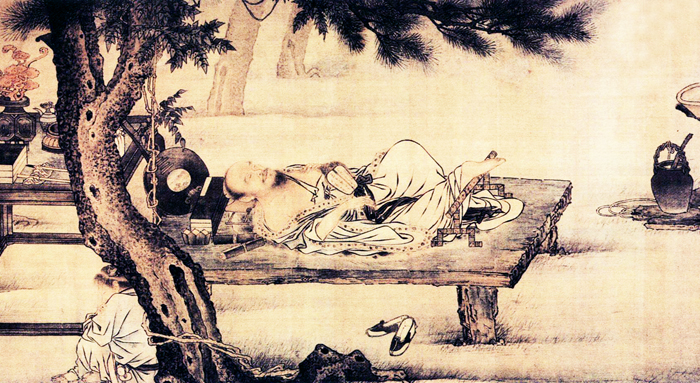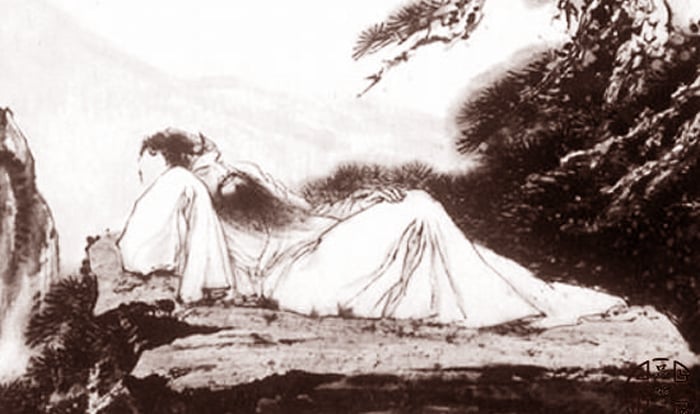The saying “Sleep is the synthesis of regulating yin and yang” is very logical. In ancient times, people believed that during the day, the “yin” in the human body is hidden, and the “yang” plays a dominant role, and all functions of the body are in an active state. But when night falls, the “yang” recedes, and the “yin” takes over, and it is time for people to sleep.
However, nowadays, sleep, which is a basic necessity, has become a challenging issue for many people. How to achieve a good night’s sleep for modern people is certainly not simple.

In ancient times, sleep was considered a pleasure and also a subject of education (Illustration)
When should you go to sleep and when should you wake up?
We all know that in ancient times, there was a great emphasis on the saying “Work when it gets light, rest when it gets dark.” For the ancients, sleep was considered a pleasure and also a subject of education.
So when did people go to bed in ancient times? The poem “Yểm yểm hoàng hôn hậu, tịch mịch nhân định sơ” (The shadows darken, the tranquility settles) in the poem “Khổng tước đông nam phi” of the Han Dynasty explained it very clearly – basically, people went to bed at the time of “nhân định” (equivalent to 9 PM to 11 PM today).
What is “nhân định”? The ancients divided a 24-hour day into 12 hours, which are dạ đán, kê minh, nhật xuất, thực thời, ngung trung, nhật trung, nhật diệt, bộ thời, nhật nhập, hoàng hôn, nhân định. There are also 12 zodiac signs corresponding to these 12 hours: Rat, Ox, Tiger, Rabbit, Dragon, Snake, Horse, Goat, Monkey, Rooster, Dog, Pig.
“Nhân định” is the hour of Rooster, which is equivalent to 9 PM to 11 PM today. Therefore, “Nhân định” is also known as “Định hôn” and “Di dạ”, implying that it is already late at night, so it is time to stop all activities and rest.
The ancients also emphasized the danger of going to bed too late. In Tạ Chiêu Triết’s “Ngũ tạp trở” of the Ming Dynasty, it is written: “Dạ độc thư bất khả quá Tí thời”, meaning that reading books in the evening should not go beyond the hour of Rat, which is from 11 PM to 1 AM. He believed that reading books beyond the hour of Rat could seriously affect one’s health.
On the other hand, the ancients revered the habit of getting up early. According to the notes in Giang Thiếu Ngu’s “Tống triều sự thực loại uyển” of the Song Dynasty, Emperor Tống Thái Tông maintained the habit of going to bed early and waking up early. He went to bed at midnight and woke up at dawn. But this required the high-ranking officials to attend the morning court session, which was around 3 AM to 5 AM today.
The famous writer Tô Đông Pha also never slept lazily, he woke up early every day. But after waking up, he didn’t immediately read or do activities. After combing his hair and getting dressed, he would find a clean chair, close his eyes and lie down for a while, called “giả mị” (fake sleep).
“Giả mị” refers to taking a nap or “catnapping”, as mentioned nowadays. Tô Đông Pha enjoyed “giả mị” and also understood the wonders of this practice.

Tô Đông Pha lying on a stone (Illustration)
The sleeping position is particularly important
The sleeping positions of modern people can be divided into three types: lying on the back, lying on the stomach, and lying on the side. The sleeping positions of ancient people can be summarized in the saying: “Stand straight like a pine tree, sit firmly like a bell, sleep curved like a bowstring.”
The ancient people did not like to sleep on their backs, and Confucius was extremely repulsed by this sleeping position. In the “Lun Yu – Hương đảng”, he said: “Tẩm bất thi, cư bất khách”, meaning that when sleeping, one should not lie on their back like a corpse, and when at home, one should not be constrained or lose their naturalness like being a guest.
Perhaps influenced by Confucius’ viewpoint, the ancient people were highly against lying straight like a stake when sleeping. They suggested that when sleeping, the body should be curved, with the knees bent, and the hands curled, so that the vitality would not be dissipated; when awake, one should relax and be active, allowing blood circulation.
Why is “lying curved like a bowstring” the best way to sleep? The physician Tôn Tư Mạc of the Tang Dynasty wrote in “Thiên kim yếu phương – đạo lâm dưỡng tính”: “Bó gối nằm nghiêng, lợi cho khí lực, tốt hơn so với nằm ngửa” (Curving the knees while sleeping is better for vitality than lying on the back).
The classic work of Daoism “Đạo tàng – hỗn nguyên kinh” also has a similar opinion: “Nằm nghiêng có lợi cho việc vận hành khí lực trong cơ thể người, đem lại sức khỏe tốt hơn so với việc nằm ngửa” (Sleeping on the side is beneficial for the functioning of vitality in the human body and brings better health than lying on the back).
In Lý Khánh Viễn’s “Trường sinh bất lão quyết” of the Qing Dynasty, the “chó nằm” sleeping position was proposed. This can be considered an explanation for the teachings of the ancients to sleep curved like a bowstring, requiring people to sleep on their sides, with the back curved, the knees bent, and the hands curled, like the position of a fetus in the mother’s womb, making the limbs, body parts, flesh, and bones relaxed and comfortable, preserving the inner vitality, and peacefully entering sleep.
Sleeping on the side is beneficial for the functioning of vitality in the human body and brings better health than lying on the back. (Image: Read01)The best position to sleep is curved to the right, which is called “cát tường thụy” (fortunate sleep) in Buddhist terms. This type of “cát tường thụy” has been scientifically proven to be very reasonable and reasonable, because from an anatomical and physiological perspective, with this sleeping position, the heart, liver, internal organs will be on the right side, so this position can reduce the pressure on the heart.
How to Make Sure You Buy the Perfect Mattress for Optimal Sleep and Health
Want to know the essentials of selecting a quality mattress that will give you a peaceful night’s sleep and boost your health? Look no further! This article provides all the key advice for finding a mattress that suits your specific needs and ensures you get a well-deserved rest. Get the important information you need to make the perfect mattress choice right here.
Tips for Keeping in Shape During the EURO Tournament
As the start of the highly anticipated EURO tournament draws near, football fans are ready to enjoy the thrill of watching their favorite teams compete. But while the excitement of watching great matches on TV is boundless, it is imperative to remember to prioritize health and safety during this period. Therefore, keeping a few simple points in mind can help make the celebrations all the more enjoyable.



































